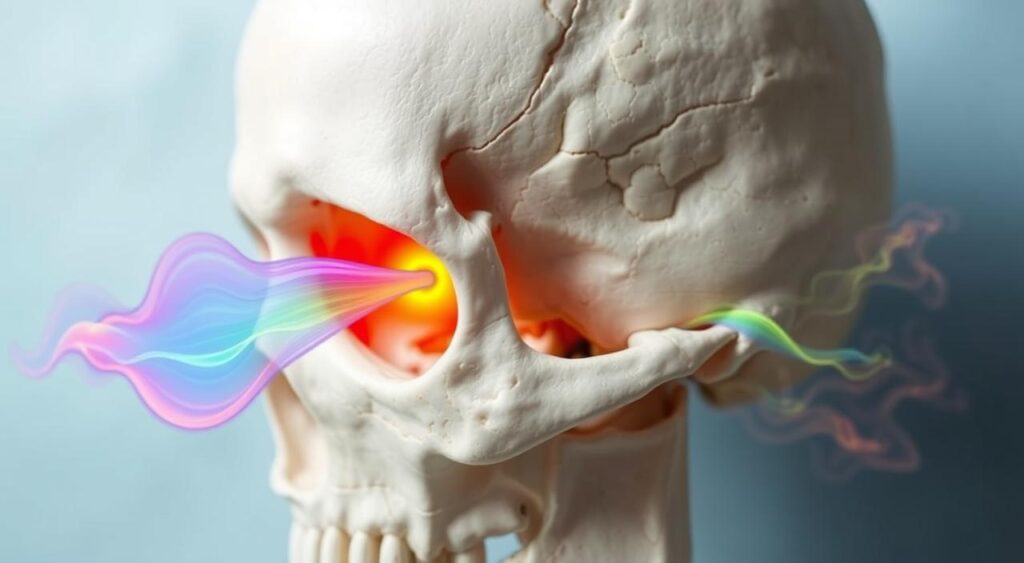Every year, 31 million people in the United States deal with sinus symptoms. It’s a common health issue that can really disrupt your day. Knowing about sinus health and treatment options is key to feeling better.
Sinus symptoms can be mild or very severe. It’s important to know the signs so you can get the right help. This guide will help you understand sinus health, common problems, and how to treat them.

Learning about sinus symptoms can help you prevent and treat them. This guide will cover all you need to know about sinus health. We’ll talk about common issues, treatment options, and how to keep your sinuses healthy.
Key Takeaways
- Recognizing sinus symptoms is crucial for effective management
- Understanding the causes of sinus symptoms can help prevent future episodes
- Various treatment options are available for sinus symptoms, including medication and lifestyle changes
- Healthy sinuses are essential for overall well-being
- Education and awareness are key to managing sinus symptoms
- Sinus symptoms can be managed with the right treatment and lifestyle changes
Understanding Your Sinus System
The sinus system is key to our respiratory health. It’s found in the skull and has hollow cavities that help with many bodily functions.
Anatomy of Sinus Cavities
The human skull has four pairs of sinus cavities. These are the frontal, maxillary, ethmoid, and sphenoid. They make the skull lighter and improve our voice.
Function of Healthy Sinuses
Healthy sinuses filter and humidify the air we breathe. They trap dust and harmful germs. They also make mucus, which keeps the nasal passages moist and clean.
Common Sinus Problems
When sinuses get inflamed or infected, problems like sinusitis can happen. Issues include blocked passages, too much mucus, and pain in the face.
| Sinus Function | Description |
|---|---|
| Air Filtration | Removes particles and pathogens from inhaled air. |
| Humidity Control | Humidifies the air to protect respiratory tissues. |
| Mucus Production | Produces mucus to trap and eliminate debris. |
| Voice Resonance | Enhances the quality and tone of the voice. |
Common Sinus Symptoms to Watch For
Your sinuses are key to your breathing health. When they get inflamed or clogged, you might notice different symptoms. Spotting these signs early can help you find the right treatment and ease your discomfort.
One common symptom is congestion, making it hard to breathe through your nose. This congestion can cause pressure in your face, especially in the forehead, cheeks, and eyes.
Another symptom is a persistent headache. This pain gets worse when you bend over or lie down. You might also notice a decrease in your sense of smell and taste, impacting your daily life.
Other sinus symptoms include:
- Postnasal drip, causing a sore throat or cough
- Fatigue due to disrupted sleep from congestion
- Facial swelling or tenderness
If you have severe sinus congestion with a high fever, vision changes, or swelling around the eyes, see a doctor right away.
Types of Sinus Conditions
Sinus conditions vary in their onset, duration, and underlying causes. Understanding each type can aid in effective management and treatment.
Acute Sinusitis
Acute sinusitis is a short-term inflammation of the sinus cavities. It usually follows a viral infection like a common cold. Symptoms include facial pain, nasal congestion, and a thick nasal discharge. It typically lasts less than four weeks.
Chronic Sinusitis
Chronic sinusitis presents as long-lasting inflammation, lasting 12 weeks or more. It can result from ongoing infections, nasal polyps, or structural abnormalities in the nasal passages. Symptoms often include persistent congestion, reduced sense of smell, and frequent headaches.
Allergic Rhinitis
Allergic rhinitis is triggered by allergens such as pollen, dust mites, or pet dander. It leads to inflammation of the nasal and sinus passages. This condition causes sneezing, itchy eyes, and a clear, runny nose. It can increase the risk of developing a sinus infection if not properly managed.
Bacterial Sinus Infections
Bacterial sinus infections occur when bacteria proliferate in the sinuses. They often follow a viral infection that weakens the immune system. Symptoms are more severe and persistent, including high fever, thick yellow or green nasal discharge, and intense facial pain. Treatment typically involves antibiotics to resolve the sinus infection.
Identifying Sinus Pressure Points
Sinus pressure can make different parts of your face and head feel uncomfortable. Knowing where these pressure points are can help ease this discomfort. It can also provide relief from sinus issues.
Here are the main sinus pressure points:
- Forehead: Pressing above your eyebrows can help with frontal sinus pressure.
- Under the Eyes: Massaging gently under your eyes targets the maxillary sinuses.
- Nose and Cheeks: Pressing the sides of your nose and cheeks can relieve ethmoid sinus pressure.
- Bridge of the Nose: Massaging the bridge can help with sphenoid sinus discomfort.
Knowing these points helps you use self-massage techniques. These can reduce sinus pressure and help you feel better.
| Sinus Pressure Point | Location | Relief Technique |
|---|---|---|
| Forehead | Above the eyebrows | Use fingertips to apply circular motions for 30 seconds |
| Under the Eyes | Beneath the eyes | Press gently and hold for a few seconds |
| Nose and Cheeks | Sides of the nose and cheeks | Massage in upward strokes to stimulate sinus drainage |
| Bridge of the Nose | Middle of the nose bridge | Use thumbs to apply firm pressure and hold |
Natural Remedies for Sinus Relief
Looking for sinus relief? Natural remedies can be a gentle and effective choice. Adding these to your daily routine may ease discomfort and boost your sinus health.
Steam Therapy
Steam therapy uses warm, moist air to calm irritated sinuses. You can make steam by using hot water or a humidifier. Lean over the bowl, cover your head with a towel, and breathe deeply for a few minutes.
This method loosens mucus and eases congestion.
Nasal Irrigation Methods
Nasal irrigation clears your nasal passages. You can use neti pots or saline sprays for this. Make sure to use distilled or boiled and cooled water for cleanliness.
Doing this regularly can greatly help with sinus relief.
Herbal Solutions
Herbs like eucalyptus, peppermint, and chamomile can also help. You can make teas, use essential oils, or add them to steam therapy. These herbs have anti-inflammatory and decongestant properties.
They help reduce sinus pressure and make breathing easier.

Medical Treatments for Sinus Problems
Several medical treatments can help with sinus congestion. Over-the-counter options are often the first choice.
- Decongestants: Help reduce swelling in nasal passages, making it easier to breathe.
- Antihistamines: Work well for sinus congestion caused by allergies by stopping histamine reactions.
- Nasal Corticosteroids: Lower inflammation in the sinuses, offering long-term relief.
For more serious sinus problems, you might need prescription medications.
- Corticosteroids: Prescribed to manage long-term inflammation and prevent it from coming back.
- Antibiotics: Used when a bacterial infection is causing sinusitis.
Choosing the right treatment depends on your specific sinus condition. Always talk to a healthcare professional. They can help you find the best medication for your sinus problems.
| Medication Type | Purpose | Usage |
|---|---|---|
| Decongestants | Reduce nasal passage swelling | Short-term relief for sinus congestion |
| Antihistamines | Block allergic reactions | Effective for allergy-induced sinus issues |
| Nasal Corticosteroids | Decrease inflammation | Long-term management of chronic sinusitis |
| Antibiotics | Combat bacterial infections | Treat bacterial sinus infections |
When to See a Doctor About Sinus Issues
If you’re dealing with ongoing or severe sinus problems, it’s time to see a doctor. Knowing when to get help can stop bigger issues and help you get better faster.
Warning Signs
- Symptoms lasting more than 10 days without getting better
- Recurring sinus infections
- Facial pain or pressure that doesn’t go away
- Fever with your sinus symptoms
Emergency Symptoms
- Severe headache or swelling around the eyes
- Vision changes or numbness
- High fever with chills
- Difficulty breathing or swallowing
Preparation for Your Doctor’s Visit
To get the most from your visit, collect this info:
- How long and how bad your symptoms are
- Any meds you’ve tried, including over-the-counter and prescription
- Your history with sinus infections or allergies
- Any questions or worries you have
Having this ready will help your doctor figure out and fix your sinus infection.
Understanding Sinus Surgery Options
If you’re dealing with ongoing sinus problems, surgery might help. Knowing your options can guide your health choices.
Candidates for Surgery
Not all with sinus issues need surgery. Those with chronic sinusitis who’ve tried other treatments might consider it. Also, severe issues like deviated septums could require surgery.
Types of Surgical Procedures
- Endoscopic Sinus Surgery: A small camera guides surgeons in fixing blockages.
- Balloon Sinuplasty: A balloon opens passages without removing tissue.
- Functional Endoscopic Sinus Surgery (FESS): This method aims to improve sinus drainage and ventilation.
Recovery Expectations
Recovery times vary by procedure. Expect some swelling and discomfort at first. Most can get back to normal in one to two weeks. It’s important to follow post-op care to avoid complications.
| Procedure | Description | Recovery Time |
|---|---|---|
| Endoscopic Sinus Surgery | Minimally invasive with quick recovery | 1-2 weeks |
| Balloon Sinuplasty | Non-tissue removing procedure | Same day to a few days |
| FESS | Comprehensive sinus repair | 2-4 weeks |
Lifestyle Changes to Prevent Sinus Problems

Healthy habits can greatly help with sinus relief and reduce congestion. Making smart choices every day keeps your sinuses clear and healthy.
- Dietary Changes: Eat foods full of antioxidants and omega-3s to fight inflammation.
- Regular Exercise: Exercise boosts circulation and helps clear out your sinuses.
- Stress Management: Yoga and meditation can lower stress, preventing sinus problems.
- Adequate Sleep: Sleeping 7-9 hours a night boosts your immune system and sinus health.
By making these lifestyle changes, you can get long-lasting sinus relief. These habits also support your overall health. Sticking to them is crucial for the best results.
| Lifestyle Change | Benefits for Sinus Health |
|---|---|
| Dietary Adjustments | Reduces inflammation and supports immune function |
| Regular Exercise | Enhances circulation and promotes sinus drainage |
| Stress Management | Prevents stress-related sinus congestion |
| Adequate Sleep | Strengthens immune response and aids recovery |
Environmental Factors Affecting Sinus Health
Your environment is key to managing sinus health and easing nasal congestion. Knowing these factors helps you create a better space for your sinuses.
Indoor Air Quality
Good indoor air quality is essential. Air purifiers can cut down on dust and pollen. Also, keep your home clean to avoid irritants that harm your sinuses.
Seasonal Influences
Seasons change, and so do challenges. Spring brings more pollen, which can cause congestion. Winter’s dry air can irritate your sinuses. Adjusting your environment with the seasons can help manage symptoms.
Workplace Considerations
At work, air quality and chemical exposure matter. Make sure your workspace has good ventilation. Also, take breaks to avoid prolonged exposure to irritants.
| Environmental Factor | Impact on Sinus Health | Tips to Manage |
|---|---|---|
| Indoor Air Quality | High levels of dust and allergens can worsen sinus symptoms | Use air purifiers and clean regularly |
| Seasonal Changes | Pollens in spring and dry air in winter affect nasal congestion | Adjust home humidity and use appropriate medications |
| Workplace Environment | Exposure to chemicals and poor ventilation can irritate sinuses | Ensure proper ventilation and take regular breaks |
Managing Chronic Sinus Conditions
Living with chronic sinusitis can be tough, especially with ongoing sinus pressure. It’s key to have a long-term plan to improve your life.
Doctors often suggest combining therapies for the best results. They might recommend nasal corticosteroids and saline sprays. These help reduce inflammation and clear out your sinuses.
Changing your lifestyle can also help a lot. Eating well, exercising regularly, and getting enough sleep boost your immune system. This can lessen your symptoms.
It’s important to find ways to cope with persistent symptoms. Yoga, meditation, and breathing exercises can help reduce stress. They also improve your overall health.
By taking a complete approach, you can tackle all parts of chronic sinusitis. Being patient and sticking to your plan can help control sinus pressure. It also means fewer flare-ups.
Conclusion
Knowing about sinus health is key to dealing with sinus symptoms. By learning about different sinus conditions and their signs, you can start to feel better. You can try natural remedies, medical treatments, or make lifestyle changes to help your sinuses.
It’s crucial to know what affects your sinuses, like changes in the environment or chronic conditions. Getting help when you need it is important. This way, you avoid serious problems and get better faster. Taking care of your sinuses regularly can also help prevent future issues.
By following the advice in this guide, you can manage your sinus health better. From learning about your sinus system to finding relief, every step helps. Make your sinus health a priority today for better breathing and comfort.
FAQ
Q: What are the most common symptoms of sinusitis?
A: Symptoms of sinusitis include facial pain or pressure and nasal congestion. You might also have thick nasal discharge and a reduced sense of smell and taste. Headaches and fatigue are common too. Sometimes, you may feel feverish and experience ear pressure.
Q: How can I find sinus relief at home?
A: For sinus relief at home, try steam therapy and use a humidifier. Warm compresses on your face can help. Nasal irrigation with a neti pot or saline spray is also effective. Drinking plenty of water is key. Over-the-counter decongestants and pain relievers can also ease symptoms.
Q: When should I see a doctor for a sinus infection?
A: See a doctor if your sinus symptoms last more than 10 days or get worse. High fever, severe headache, and swelling around the eyes are signs of a serious infection. Vision changes also warrant a doctor’s visit.
Q: What is the difference between acute and chronic sinusitis?
A: Acute sinusitis lasts up to four weeks and is often caused by viruses. Chronic sinusitis lasts over 12 weeks and may be due to inflammation, nasal polyps, or bacteria. Chronic cases need more treatment.
Q: Can nasal congestion lead to other health issues?
A: Yes, long-term nasal congestion can cause sinus infections and ear infections. It can also disrupt sleep and breathing. This can affect your overall health and well-being.
Q: What are the benefits of nasal irrigation for sinus health?
A: Nasal irrigation clears out mucus, allergens, and irritants. It reduces congestion and inflammation. This can provide relief, improve breathing, and lower the risk of infections. Using saline solutions is safe and effective.
Q: When is sinus surgery necessary?
A: Sinus surgery is needed for chronic sinusitis that doesn’t respond to treatments. It’s also for recurring infections or structural issues like nasal polyps. Surgery aims to improve drainage and reduce symptoms.
Q: Are there natural remedies that can help alleviate sinus pressure?
A: Yes, natural remedies like steam inhalation and warm compresses can help. Herbal teas, essential oils, and staying hydrated also reduce pressure. Keeping indoor air clean and avoiding allergens helps prevent discomfort.
Q: How does allergic rhinitis affect sinus health?
A: Allergic rhinitis causes sneezing, itching, and congestion. This leads to inflammation and blockage in the sinuses. It increases the risk of infections and chronic sinusitis by disrupting drainage and function.
Q: What lifestyle changes can help prevent sinus problems?
A: To prevent sinus issues, eat a healthy diet and stay hydrated. Manage stress and exercise regularly. Avoid smoking and pollutants. Use air purifiers and practice good hygiene to reduce infection risk.
